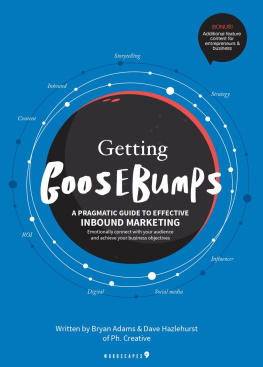MKTG
Table of Contents
Guide
List of Illustrations
List of Tables
Copyright Statement
MKTG
COPYRIGHT 2021, 2019 Cengage Learning, Inc.
ALL RIGHTS RESERVED. No part of this work covered by the copyright herein may be reproduced or distributed in any form or by any means, except as permitted by U.S. copyright law, without the prior written permission of the copyright owner.
For product information and technology assistance, contact us at Cengage Customer & Sales Support, 1-800-354-9706 or support.cengage.com.
For permission to use material from this text or product, submit all requests online at www.cengage.com/permissions.
Library of Congress Control Number: 2020904984
Student Edition ISBN: 978-0-357-12780-3
Cengage
200 Pier 4 Boulevard
Boston MA 02210
USA
Cengage is a leading provider of customized learning solutions with employees residing in nearly 40 different countries and sales in more than 125 countries around the world. Find your local representative at www.cengage.com.
Cengage products are represented in Canada by Nelson Education, Ltd.
To learn more about Cengage platforms and services, register or access your online learning solution, or purchase materials for your course, visit www.cengage.com.
Part The World of Marketing
An Overview of Marketing

Rawpixel.com/Shutterstock.com
Learning Outcomes
After studying this chapter, you will be able to
- 1-1 Define the term marketing
- 1-2 Describe four marketing management philosophies
- 1-3 Discuss the differences between sales and market orientations
- 1-4 Describe several reasons for studying marketing
1-1. What Is Marketing?
What does the term marketing mean to you? Many people think marketing means personal selling. Others think it means advertising. Still others believe that marketing has to do with making products available in stores, arranging displays, and maintaining inventories of products for future sales. Actually, marketing includes all of these activities and more.
Marketing has two facets. First, it is a philosophy, an attitude, a perspective, or a management orientation that stresses customer satisfaction. Second, marketing is an organizational function and a set of processes used to implement this philosophy.
The American Marketing Associations (AMA) definition of marketing focuses on the second facet. According to the AMA, marketing is the activity, set of institutions, and processes for creating, communicating, delivering, and exchanging offerings that have value for customers, clients, partners, and society at large.
Definition of Marketing, American Marketing Association, www.marketingpower.com/AboutAMA/Pages/DefinitionofMarketing.aspx (accessed October 3, 2018).
Marketing involves more than just activities performed by a group of people in a defined area or department. In the often-quoted words of David Packard, cofounder of Hewlett-Packard, Marketing is too important to be left only to the marketing department. Marketing entails processes that focus on delivering value and benefits to customers, not just selling goods, services, and/or ideas. It uses communication, distribution, and pricing strategies to provide customers and other stakeholders with the goods, services, ideas, values, and benefits they desire when and where they want them. It involves building long-term, mutually rewarding relationships when these benefit all parties concerned. Marketing also entails an understanding that organizations have many connected stakeholder partners, including employees, suppliers, stockholders, distributors, and others.
Research shows that U.S. companies chosen as the top places to work by employees outperformed the stock market by 2.8 to 3.8 points per year, no matter what the broader economic conditions.
Maggie McGrath, with Lauren Gensler and Samantha Sharf, Competition is the New Union, Forbes, December 26, 2017, pp. 5658.
Michael E. Bush and Sarah Lewis-Kulin, 100 Best Companies to Work for 2018, Fortune.com, March 1, 2018, pp. 5393.

Bjorn Bakstad/Shutterstock.com
Salesforce was selected number 1 in Fortunes 100 Best Companies to Work\For in 2018, partly based on its unique company culture.
Marketing is too important to be left only to the marketing department.
David Packard , cofounder of Hewlett-Packard
One desired outcome of marketing is an exchange people giving up something in order to receive something else they would rather have. Normally, we think of money as the medium of exchange. We give up money to get the goods and services we want. Exchange does not require money, however. Two (or more) people may barter or trade such items as baseball cards or oil paintings.
An exchange can take place only if the following five conditions exist:
There must be at least two parties.
Each party has something that might be of value to the other party.
Each party is capable of communication and delivery.
Each party is free to accept or reject the exchange offer.
Each party believes it is appropriate or desirable to deal with the other party.
Philip Kotler and Kevin Lane Keller, A Framework for Marketing Management, 6th ed. (Upper Saddle River, NJ: Prentice Hall, 2016).
Exchange will not necessarily take place even if all these conditions exist, but they must exist for exchange to be possible. For example, suppose you place an advertisement in your local newspaper stating that your used automobile is for sale at a certain price. Several people may call you to ask about the car; some may test-drive it; and one or more may even make you an offer. All five conditions that are necessary for an exchange to occur exist in this scenario. But unless you reach an agreement with a buyer and actually sell the car, an exchange will not take place.
Notice that marketing can occur even if an exchange does not occur. In the example just discussed, you would have engaged in marketing by advertising in the local newspaper, even if no one bought your used automobile.
1-2. Marketing Management Philosophies
Four competing philosophies strongly influence an organizations marketing processes. These philosophies are commonly referred to as production, sales, market, and societal marketing orientations.
1-2a. Production Orientation
A production orientation is a philosophy that focuses on the internal capabilities of the firm rather than on the desires and needs of the marketplace. A production orientation means that management assesses its resources and asks these questions: What can we do best? What can our engineers design? What is easy to produce, given our equipment? In the case of a service organization, managers ask, What services are most convenient for the firm to offer? and Where do our talents lie? The furniture industry is infamous for its disregard of customers and for its slow cycle times. For example, most traditional furniture stores (think Ashley or Havertys) carry the same styles and varieties of furniture that they have carried for many years. They always produce and stock sofas, coffee tables, arm chairs, and end tables for the living room. Master bedroom suites always include at least a queen- or king-sized bed, two dressers, and two side tables. Regardless of what customers may actually be looking for, this is what they will find at these storesand they have been so long-lived because what they produce has matched up with customer expectations. This has always been a production-oriented industry.















